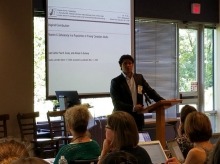Maryland University of Integrative Health (MUIH) held its inaugural nutrition symposium Nutritional Genomics in Clinical Practice at their main campus in Laurel, MD on June 23-25, 2017.

|
Sherryl Van Lare, M.S., CNS, LDN, a student in the Doctor of Clinical Nutrition program, as well as a teaching assistant and secretary of the MUIH Student Delegation Secretary, attended the symposium and provided this summary of the weekend-long event.
Nutritional genomics, or nutrigenomics, is an evolving field that emphasizes the critical intersection of nutrition and genetic expression. The symposium centered specifically on translating nutrigenomics information for the clinician and clinical practice. It was presented in partnership with the Maryland Naturopathic Doctors Association (MNDA).
Over the course of three days, leaders in the field of nutrigenomics presented to a group of 95 naturopathic doctors, nutritionists, academics, students, and other healthcare professionals from across the US. Dr. Christina Sax, MUIH’s Provost and Vice President, Academic Affairs, who also holds a Ph.D. in Human Genetics, led a pre-symposium workshop on genetics and genomics. Dr. Liz Lipski, Director of Academic Development, Nutrition and Integrative Health at MUIH, officially opened the symposium with welcoming remarks and then introduced the keynote speaker, Dr. Ahmed El-Sohemy. Dr. El-Sohemy’s presentation, titled Do Our Genes Determine What We Should Eat?, explored the connection between what we eat, our genes, our health, our body’s performance, as well as how genes can influence our food preferences.
Many of the presentations throughout the symposium covered themes such as: genetic modification through diet and lifestyle; reactions to specific food or substances, such as caffeine or gluten, based on individual genetic variations; and how nutrigenomic determinants can affect the aging process, behavioral disorders, fertility, immunity, and other physical outcomes. In all, 13 thought leaders in the field of nutrigenomics lectured on a wide variety of topics related to the connection between nutrition and gene expression. Click here for a list of all the presenters and their presentation topics.
 |
Breakout sessions were held throughout the conference and covered topics including culinary genomics, nutrigenomics and neurotransmitters, precision testing combining genomic and microbiome data, nutrient-specific genes, and using nutritional genomics to personalize clinical application. On Friday evening, a reception was held for MUIH alumni, students, and faculty attendees. In between presentations and breakout sessions, attendees had the opportunity attend panel discussions, network with each other, and visit with the symposium exhibitors. Dr. Sax concluded the event on Sunday with closing remarks.
A central theme emerged from the weekend-long event; that each individual’s genetic interaction with the food they eat and their environment is unique, and that there is no one perfect diet that will the same for everyone. Genomic testing, along with functional testing such as nutrient level analysis, can allow experienced clinicians to develop personalized therapeutic plans for their clients that will optimize their interactions between the food they eat, their lifestyle, their environment, and their unique genetic makeups. The information food provides to our genes can have a significant impact on chronic disease, aging, mental health, and more.
Nutritional Genomics in Clinical Practice was supported by exhibitors from Courtagen Life Sciences, Inc., Designs for Health, Diagnostic Solutions Laboratory, Genova Diagnostics, and NatureKue. Learn more about our exhibitors here.